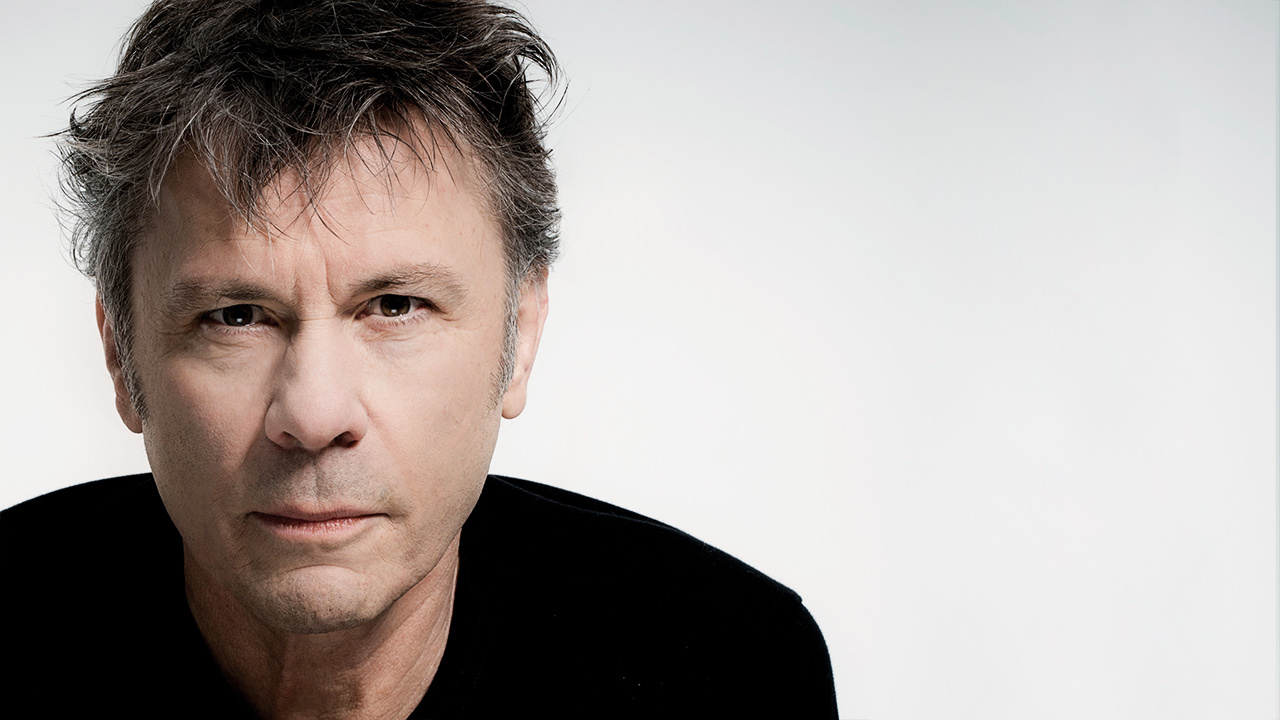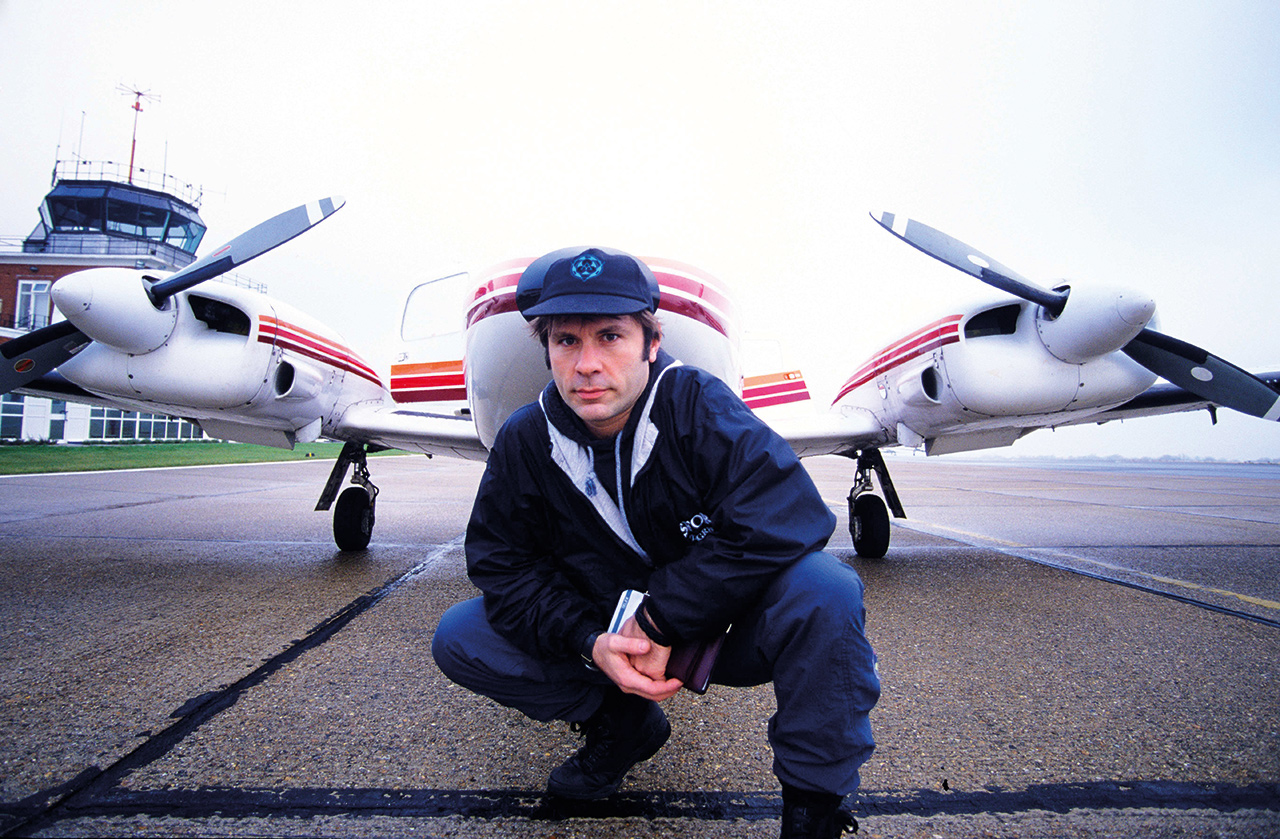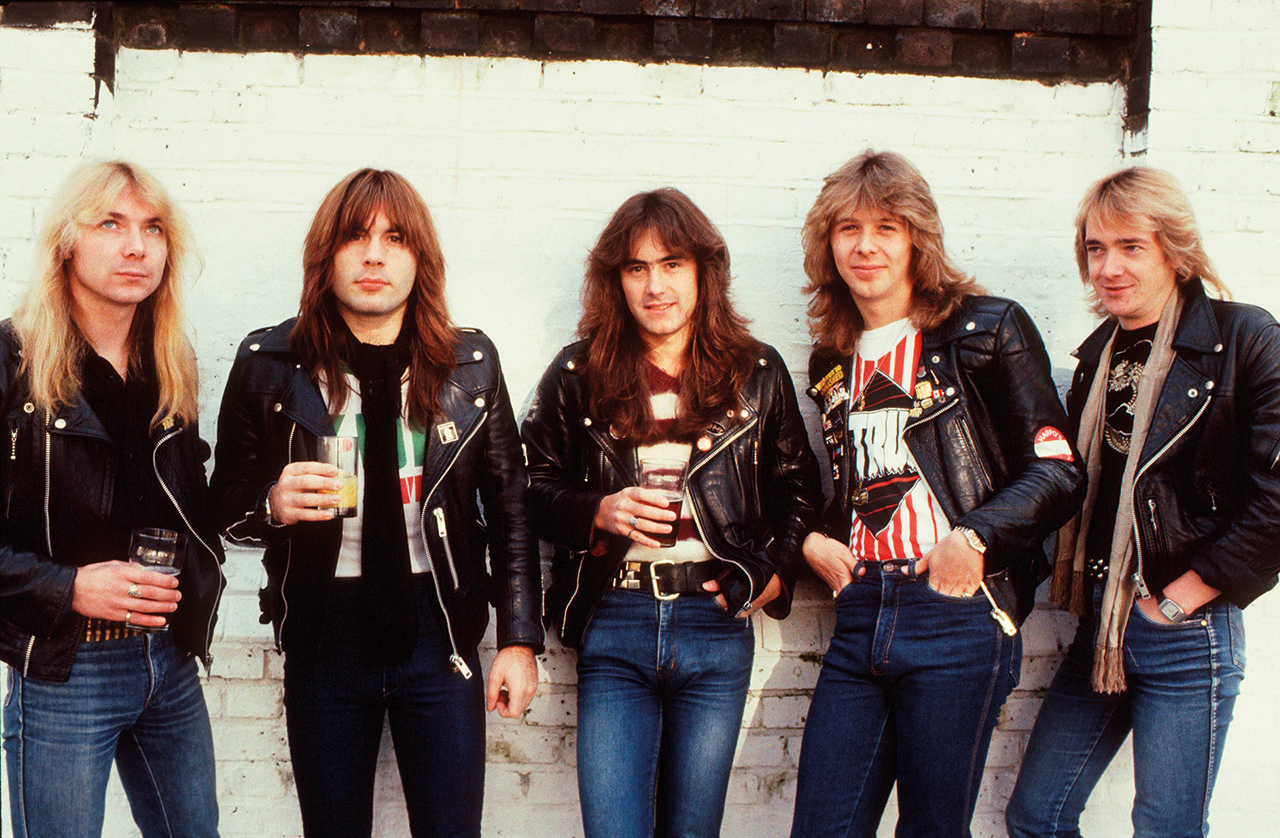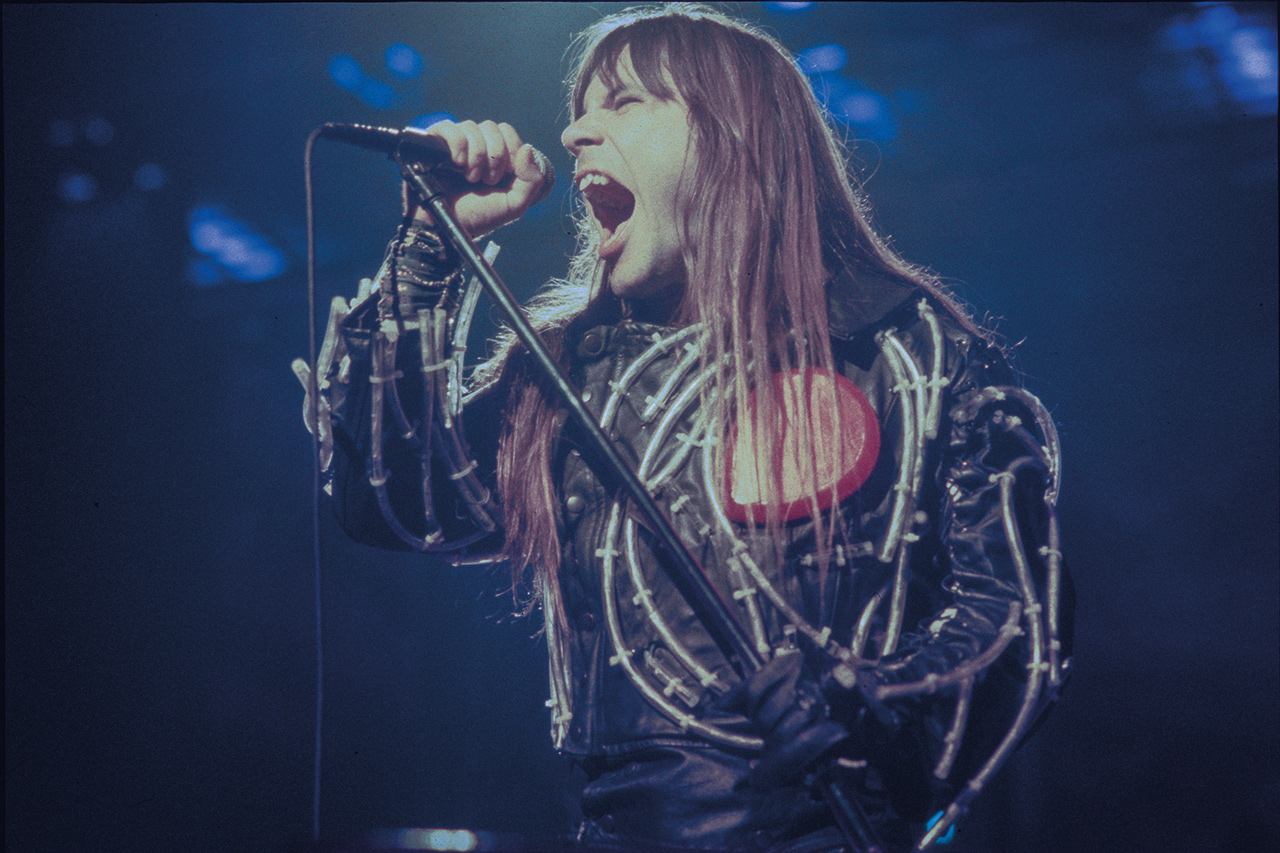Bruce Dickinson: "My self-belief was completely irrational"
We catch up with Iron Maiden frontman Bruce Dickinson about his new autobiography - plus read an exclusive extract from the book below!

If you only read one book this year, you need to read more books. But if you do only read one, it absolutely must be Bruce Dickinson’s new autobiography, What Does This Button Do? Arguably the only figure in our world who can lay claim to being a metal megastar, airline pilot, fencing champ, cancer survivor and all-round Duracell-powered force of nature, Bruce has more and better stories to tell than most. Unsurprisingly, the book is every bit as entertaining and bursting with energy as you might expect.
Speaking to Hammer during a rare moment when the Dickinson backside is planted in a chair and not whizzing off to do something spectacular or dangerous, Maiden’s seemingly indestructible vocalist is as ebullient as ever, as he lays out his approach to sharing his life and times.
“Well, first off, I’m not sitting on a couch with a therapist, saying ‘Poor me, I’ve always wanted to get this off my chest…’,” he chuckles. “I didn’t want it to be that. One of the most fun autobiographies I’ve read, [legendary Hollywood actor] David Niven’s The Moon’s A Balloon, has nothing desperately horrible in it; it was just a really good romp through his life. That was the sort of thing I wanted to do. It certainly didn’t want to be [Mötley Crüe bio] The Dirt, because that’s not who I am. I just think that all the mad things I’ve done are more entertaining and interesting than an endless tale of drug abuse and shagging!”
While it goes without saying that Maiden fans will be all over Bruce’s book like a dose of shingles, there is far more to What Does This Button Do? than a cosy trawl through the history of the world’s best-loved metal band. Stretching from his birth in 1958 to the brink of Maiden’s recent Book Of Souls tour, it’s a fascinating and endearingly rambunctious account of a life lived at full pelt, with Bruce’s many obsessions – music and flying planes the most significant among them, of course –looming large throughout. The early chapters are particularly revealing, as he recounts being raised by his grandparents for the first five years of his life, while his parents toured the nation’s nightclubs with, um, “a performing dog act”. In their absence, it becomes plain that other family members had the biggest impact on the young boy’s development, not least his grandfather Austin and, in particular, his “uncle” John (Bruce’s godfather), a former RAF electrical engineer whose tales of aircraft and airborne derring-do would spark Bruce’s lifelong interest in aviation. And we all know how that turned out.
What comes across strongly in those early tales is that, despite its slight air of unconventionality, Bruce remembers his upbringing with fondness.

“Families are a very strange mix of duties, responsibility, ‘blood is thicker than water’ and all the rest of it,” he says. “I’m not going to be judgmental about my parents and say, ‘Quick, lie me down on the therapist’s couch!’ You get dealt the hand you get and it wasn’t so bad. As I say in the book, it could’ve been a whole lot worse. There’s no reason why some of your family should be more inspirational than others, simply because they were more involved in your creation. Other people in your family can be equally inspirational and that’s absolutely fine.”
Despite being fascinated by aircraft, engineering and any kind of machine from a very early age, it was music that would prove to be the defining love of Bruce’s life. There are several moments in the book that stand out as pivotal events that would shape the journey ahead, but one in particular leaps from the page like an exuberant heavy metal frontman hurling himself from a drum riser.
Sign up below to get the latest from Metal Hammer, plus exclusive special offers, direct to your inbox!
“Yeah, I talk about having compulsory singing practice at private school, in church, with this half-deaf reverend who comes up to me and says, ‘You’ve got a good voice!’” Bruce notes. “I thought, ‘Oh… have I?’ and that was it, down the slippery slope! That comment was the moment when the boat started going down the slipway, and it’s those tiny things, the beating of the butterfly wings on the other side of the world, that change the course of people’s lives.”
That brief encounter with the clergy set wheels in motion, but the clincher came when he began to attend rock and prog gigs at boarding school. From then on, music became Bruce’s chief hobby and, more importantly, something he clearly felt he could participate and excel in. But even after digging up those early memories of discovering thunderous hard rock for the first time, he insists he still doesn’t really understand why music consumed him with such intensity.
“I don’t know why it happened,” he laughs. “I think it’s a question of going into the emotions that music produced for me, which were so deep down that I felt nothing else could come close. I suppose that figuring out that I could sing opened up an almost intellectual side to doing it. I thought, ‘If I can sing, I can tell stories, and if I’m telling stories I can paint pictures…’ Singing, of course, eventually became incredibly physical. I’m famous for running around like a raving lunatic onstage, and that’s part of it. I can’t just stand there and not move my body, it’s just part of me. So, for me, music is that strange mix of the emotional, the intellectual and the physical.”

Perhaps the one factor that’s made Bruce such an unstoppable force over the last few decades is his supreme confidence and self-belief. What Does This Button Do? is by no means an exercise in braggadocio and Bruce is never any less than self-effacing and happy to acknowledge mistakes and self-inflicted calamities, but that fiery commitment to achieving his goals has seen him through the best and worst of times and has had an undeniably profound effect on his unquestionable brilliance as a frontman.
“It’s very strange, because I had this self-belief which was completely irrational!” he laughs. “I think anybody that becomes successful has got to have that self-belief, and it’s not based on any logic. If you sat down and looked at it and said, ‘What are the chances?’, you’d go, ‘No, give up, you’re never gonna make it as a rock star…’ People do fall by the wayside, but I always admire people who have a dream. If the passion and belief are there, you just know they’ll do it. Also, part of believing that you can do it is not giving up. That’s equally important. Of course, you can end up in a situation where you’re broke, living in a hovel and being a daydreaming waster. That’s the dark side of it, but that’s the chance you take when you roll the dice and decide to throw yourself into something.”
One of the most intriguing parts of Bruce’s book is his account of his early days with Maiden and the friction that swiftly developed between him and Steve Harris. Those two strong personalities clashed noisily and often as Maiden rocketed towards global glory, with a few physical altercations and some extremely robust arguments along the way, but it’s obvious that despite their obvious differences as people, Bruce always recognised Steve as a kindred spirit; someone whose passion and indefatigability mirrored his own.
“Steve is extremely determined and for a mild-mannered, shy sort of chap offstage, he’s got quite a ruthless streak in him,” Bruce grins. “Not in a bad way or an exploitative way, but he’ll go, ‘This is not working and there’s no way round it…’ He can be very, very stubborn and, of course, so can I! Ha ha ha!”
Musical triumphs aside, the one thing that everyone knows about Bruce is that he is a fully qualified airline pilot. At this point, his flying career is merely an accepted part of what he does, but back in the 90s the notion that the singer in a successful band could also forge a career in aviation was preposterous. But with Uncle John’s RAF tales still echoing faintly in the back of his mind, Bruce began to edge towards earning a pilot’s licence, albeit not before another member of Iron Maiden did it first.
“First of all, Nicko became a pilot and [in the book] there’s a very terrifying story involving fencing and sleeping on floors in ferry terminals, and the chapter is called, ‘You’ll believe a drummer can fly’, ha ha!” Bruce chuckles. “But that was the moment where I thought, ‘You know what? I’m kind of interested in all this flying business…’ I didn’t think I’d ever be a pilot, but at least I could play around with an early portable computer and put Microsoft Flight Sim on it, so I did but I got bored of it very quickly.”
With his enthusiasm mounting by the hour, Bruce arrived at what he describes as his “Road to Damascus moment” while on holiday in Florida in July 1992.
“I took a trial flying lesson and it really was an ‘Oh my god!’ moment, you know? That was another slippery slope that eventually led to actually getting a job flying airliners, which also involved being in New York on 9⁄11, so there’s a chapter about that, too. There are some pretty hairy stories in there. If you’re afraid of flying, it might not be the book to read before bedtime, ha ha ha!”
Even the biggest and best-informed Bruce Dickinson fans on the planet may find themselves startled after reading one particular chapter entitled ‘Into The Fire. It’s an account of the singer’s frankly deranged decision to play a solo gig in the middle of war-torn Sarajevo at the height of the Bosnian conflict in 1994. Next time you hear a band moaning because they have to put up with a few days in smelly van, refer them to the fact that after the gig, Bruce took a selfie in the middle of no man’s land and was told by his army driver that the “last bloke who did that got shot”.
“We drove into the middle of a warzone and did a gig. We did it because we could, really, and we didn’t want to give up! It was bonkers, but it’s a brilliant story!”

This is not the first time Bruce has written a book. Fans will recall the laudably smutty but somewhat amateurish novels – The Adventures Of Lord Iffy Boatrace and The Missionary Position – that he penned and published in the 90s. Nearly 30 years on, his skills as an author have improved immeasurably, and What Does This Button Do? skitters along with wonderful fluency and verve, from humble start to epic finish. Anyone hoping for the dishing of music biz dirt will be disappointed, however, as Bruce insists that he avoided including anything that might detract from the book’s overall narrative flow. That’s not to say that the book is toothless: all the fallings out and splits within and without Iron Maiden are explored with disarming honesty and pragmatism. Bruce is plainly conscious of people’s prurient interest in life’s salacious and painful moments, but in keeping with his (and Maiden’s) reputation for being down-to-earth and comparatively non-cynical, he has no desire to puncture or polish any egos.
“I’ve already had people emailing me, saying, ‘I hope you’re not going to say anything horrible about me, because my lawyers will be on it like a shot!’ and I haven’t got the heart to call them and say, ‘I’m really sorry, but you’re not important enough to be in it!’ So that’s amusing. When it comes to Maiden, I talk about those things but don’t dwell on them for ages. I deal with them sensitively, I think. It’s just stuff that happens and maybe it shouldn’t happen sometimes, but it does, and so I’ve written how it feels when it does happen. Shit happens because we’re human beings.”
There is no shortage of great books about rock’n’roll and heavy metal, but precious few of them will leave you feeling like you’ve been plugged into the mains for several days. What Does This Button Do? is essentially the Bruce Dickinson experience – effervescent, passionate, remorselessly energetic and ever so slightly mad – transferred to the printed page. It ends, as you might expect, with a mischievous flourish and a palpable sense that whatever he does next, it will almost certainly be worth reading about in the future.
“The book stops at the beginning of The Book Of Souls tour, which is when I’d just set foot in the 747 simulator, about to learn how to fly it, before going off on tour,” Bruce concludes. “The last line is, ‘What does this button do then?’ and, strangely enough, that’s disturbed the German publishers! They found the title very unsettling. Maybe it gets lost in translation, but their feeling was, ‘Why would you push a button if you don’t know what it does?’ But then that’s kind of the whole point. Why wouldn’t you?”
What Does This Button Do? is out on Oct 19 via Harper Collins. You can read an exclusive extract below
Blood, gangs and guns
In a world-exclusive extract from What Does This Button Do?, Bruce tells us about Maiden’s explosive first trip to South America
Rumours were afoot of a dramatic and exotic development – an undiscovered continent. Iron Maiden world was about to go Brazil nuts. We were headed south, to Rio de Janeiro. I had never heard of Varig Airlines or held a Brazilian banknote. I had no idea where Copacabana Beach was or the Corcovado or Sugarloaf Mountain. I had never met the Girl from Ipanema and never tasted a caipirinha. Brahma was an Indian monk, not a beer, and I had no idea that wiggling your bottom could be a national sport. I also had no idea who Frank Sinatra’s lawyer was.
Rock in Rio, the first one ever, was a 10 – on any scale of 1 to 10. I suppose I could get picky about the band, or my performance, but actually that isn’t the point. It was a show that broke Iron Maiden in an entire continent overnight.
Initially, we turned it down. In the throes of selling out American shows back to back, a two-week break in Brazil seemed like madness. Yet the Rock in Rio offer seemed too good to be true. At every turn their lawyer just said yes.
‘We want you for two shows in two weeks.’
‘We only do one.’
‘Yes.’
And so it went on. First-class travel, a massive fee, merchandising equivalent to a week of sold-out US shows, personal spending money, luxury hotels, guaranteed air freight for 30 tons of equipment – the answer was always,‘Yes. Anything else?’
On arrival in Rio, our clothes were almost torn from us by screaming fans, many of them extraordinarily good-looking females. We were pursued to our hotel on Copacabana Beach, which itself was surrounded 24 hours a day by hundreds of fans.
For the next week we would be prisoners in the hotel, along with several other artists, until the moment we were released to go to the festival, and what an incredible enterprise the whole thing was.
Three full stages had been created with a railway track laid down to rotate them before a specially designed and constructed festival set-up with a capacity of 300,000 people.
The biggest stars from the international music world, plus all the biggest local talent, were playing in a non-stop orgy of entertainment for two weeks. The TV rights alone were worth a fortune. Cynics might say the whole operation was a huge money-laundering operation. One thing was for sure: there was certainly a lot of it washing around.
We just enjoyed the ride, quite literally. The last time I had been in a helicopter was when I was chucked out of the side of a Westland Wessex in a tick-infested forest in Thetford. Today was somewhat more luxurious as we climbed aboard for the 10-minute ride to the festival site.
We were not yet headliners; that honour belonged to Queen, who were on stage after us. Even so, it was clear that there was massive expectation for Maiden.
The festival site itself was a chaotic blur. Tempers and tension were running high backstage. There was a barely visible sense of order, and a sense that disorder might break out at any time.
Two rival security firms were at each other’s throats. Both had dogs and both had guns. They were involved in a standoff outside our dressing room. Leashed, fanged beasts with spiked collars were being held at bay at opposite ends of the corridor.
We waited in our dressing room for the signal that the stage was ready, oblivious to the commotion. In the hallway outside, guns were brandished and there was much trading of insults, and presumably aspersions cast about family members in Brazilian Portuguese. Once it all cooled off and the guns were holstered, we got the green light.
Rio was the biggest crowd I have ever played, and probably ever will. It seemed to disappear beyond the horizon, past the hazy floodlit pools of colour and into the blackness.
The surge of adrenalin as we ran out was immense, like a dozen Olympic 100-metre starts rolled into one. All these people, all that emotion, and … the sound was awful. We had brought our own monitors, but some of the gear was local, and the monitor engineer was a stranger. I waved my arms, trapped between a rock and a hard place. You can’t stop in front of 300,000 people and do a soundcheck.
By the time we got to Revelations I had put on my rather natty electric-blue Ibanez guitar. It matched the rather stylish electric-blue acoustic Ovation that I still have. The anger built as I tried to communicate with the engineer at the side of the stage. Hot and bothered, I wrenched the guitar off, over my head, and split my forehead open on its wooden edge.
My head was bleeding profusely as I approached the monitor board.
The engineer saw the blood and looked horrified. ‘Fucking fix the sound – don’t fucking stand there like a goldfish,’ I ranted.
I expect I looked like a raving lunatic, which at that moment I was. To prove a point, I smashed my guitar across the mixing desk, and broke it halfway down the neck.
‘FIX IT!’ I screamed.
The sound did not improve, so I threw all the wedge monitors off the front of the stage. Crowds love this sort of thing; they think it’s show time. Sometimes it may be, but sometimes it’s not. This whole spectacle was being shown live on TV across millions of Latin American households.
I did a bit more singing and then went behind the amps to calm down a bit. A roadie gave me a towel to wipe the blood away from my eyes, and then another member of the crew showed up, very excited. He looked carefully at the wound.
‘Rod says can you squeeze it and make it bleed some more,’ he said. ‘It looks great on the telly.’
Next day, the picture was front-page news: sweaty, blood-stained me, and 300,000 new Iron Maiden fans.
We relished it all, and the comedown from the show lasted all night. It was a late show in any case, so it was four or five in the morning when we got to the hotel. Our ears were still ringing and alcohol seemed to have no soporific effect; the adrenalin rush was still overpowering the body’s efforts to sleep.
I walked into the hotel lobby at about 6 a.m. There were no fans. The road was deserted out to the beach, and the sun was deliciously eyeball-roastingly warm, just before it would become scorchingly unbearable.
It was a strange feeling to be free after six days under siege. I indulged in the forbidden fruit of escaping without a minder and slowly crossed the road, took off my shoes and sat down on the beach, wiggling my toes in the hot sand.
Not long now, and then back on a plane to the middle of winter. What a fucking weird life this is, I thought to myself. I looked to my left. There was Brian May, eyes closed, face towards the sun, probably thinking something similar. I left him to it. Funny old world, really.
Bruce Dickinson’s Scream For Me Sarajevo documentary set for UK cinemas
What Does This Button Do? by Bruce Dickinson review
Bruce Dickinson: I Knew I'd Joined A Great Band. I Knew I Could Make It Better
Scream For Me: How Bruce Dickinson Helped Take Iron Maiden To The Top

Dom Lawson has been writing for Metal Hammer and Prog for over 14 years and is extremely fond of heavy metal, progressive rock, coffee and snooker. He also contributes to The Guardian, Classic Rock, Bravewords and Blabbermouth and has previously written for Kerrang! magazine in the mid-2000s.
